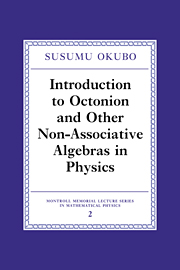Book contents
- Frontmatter
- Contents
- Preface
- 1 Introduction
- 2 Non-associative algebras
- 3 Hurwitz theorems and octonions
- 4 Para-Hurwitz and pseudo-octonion algebras
- 5 Real division algebras and real Clifford algebra
- 6 Clebsch–Gordan algebras
- 7 Algebra of physical observables
- 8 Triple products and ternary systems
- 9 Non-associative gauge theory
- 10 Concluding remark
- References
- Index
10 - Concluding remark
Published online by Cambridge University Press: 15 September 2009
- Frontmatter
- Contents
- Preface
- 1 Introduction
- 2 Non-associative algebras
- 3 Hurwitz theorems and octonions
- 4 Para-Hurwitz and pseudo-octonion algebras
- 5 Real division algebras and real Clifford algebra
- 6 Clebsch–Gordan algebras
- 7 Algebra of physical observables
- 8 Triple products and ternary systems
- 9 Non-associative gauge theory
- 10 Concluding remark
- References
- Index
Summary
In this short treatise, we have given some ideas for applying non-associative algebras to physical problems. However, we have had to omit many other topics related to our subject in order to make our treatment as self-contained as possible. We have not mentioned the important technical method of the Peirce decomposition, which is crucial for determining the structures of many non-associative algebras. Nor have we presented the subject of the Tit construction, or the Freudenthal–Kantor constructions of exceptional Lie algebras. Similarly, the representation theory of Jordan algebra might have been addressed. Regarding physics, we have not touched on the matter of quaternionic and octonionic Hilbert spaces, and their possible relevances to physics. Nor has the subject of non-associative generalizations of the so-called propositional calculus and related subjects in quantum mechanics been given any attention. The latter problems have been discussed by Günaydin and by Truini and Biedenharn, who utilized the Jordan triple system and the Jordan-pair systems. Moreover, nothing has been said on the possible relevance of non-associative algebras for second quantizations of closed string models, in view of the so-called non-associative anomaly. Also, the triangle anomaly in quantum field theory may lead to a violation of the Jacobi identity for the algebra of currents, leading to non-associative physics. A non-associative algebra also occurs in some integrable classical mechanics problem. Further, a non-associative algebra has been utilized for construction of the B-type vertex operator in the string model.
- Type
- Chapter
- Information
- Publisher: Cambridge University PressPrint publication year: 1995

